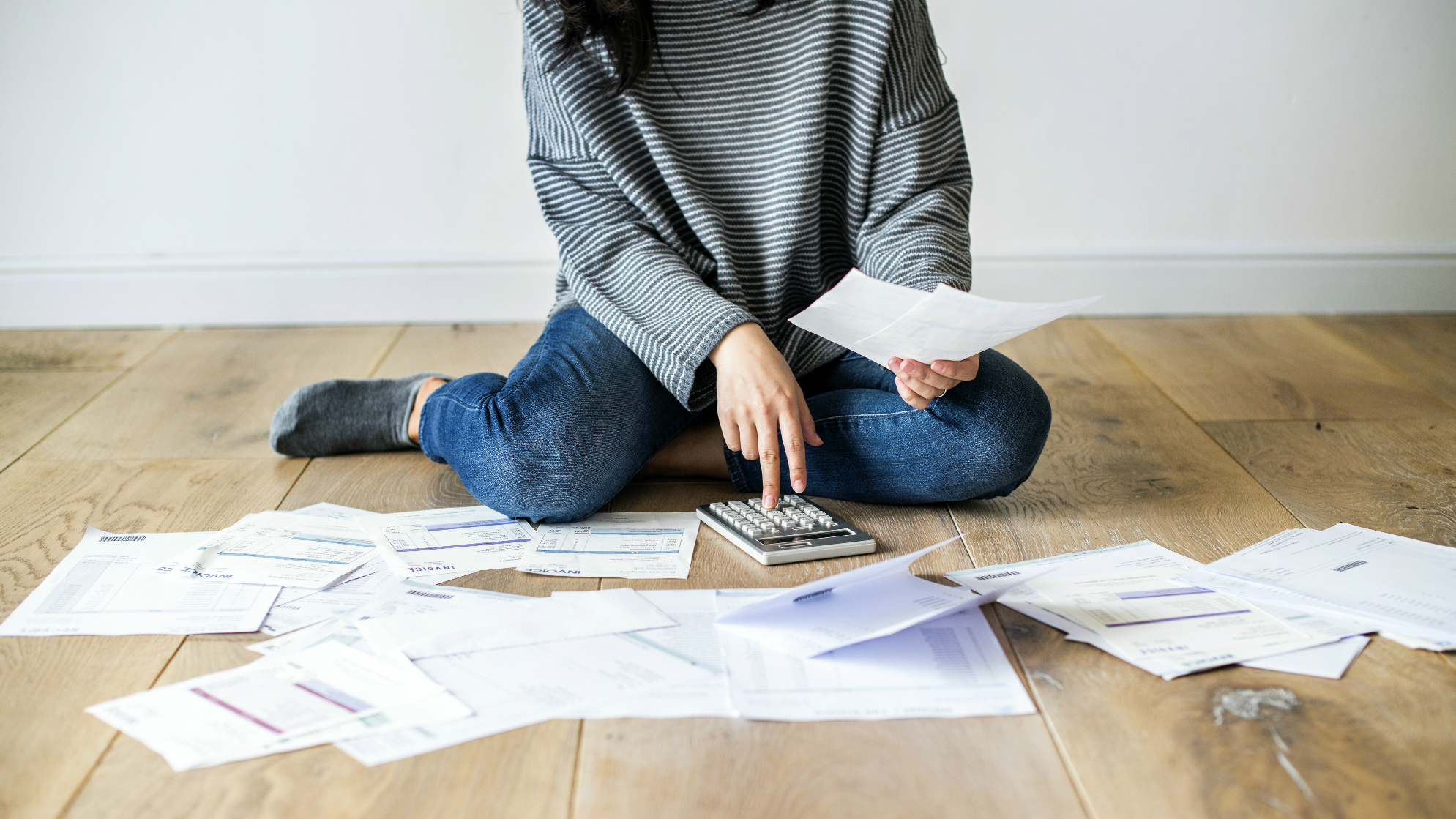"My partner cleared out my bank account and left me thousands in debt"


Conversations around domestic abuse peaked in 2020 and 2021 as the pandemic and subsequent lockdowns saw a spike in intimate partner violence. Now in 2022 as we face a cost of living crisis, it's time to talk about financial abuse.
Often misunderstood and unrecognised, financial abuse is underreported and underdiscussed as a form of abusive behaviour. But as Marisa Bate reports, it forces many women into poverty and despair. Now, at last, banks and the government are taking it seriously.
"We met when I was only 19. I was very insecure about how I looked, so when somebody came along and was willing to call me their girlfriend, I couldn't believe my luck." What Rosie*, 31, didn’t know then was that she was about to enter a five-year abusive relationship that would leave her with PTSD, needing reconstructive surgery - and financially devastated.
Throughout her violent and emotional abusive relationship, Rosie’s ex-partner also demanded her pin codes and cleaned out her bank account by taking out loans and store cards in her name, and leaving her responsible for finding work to support them, even when she was pregnant and then looking after their child.
"You’re made to feel bad whenever you dare to ask for money; you’re constantly kept in this poor financial state. And what people don't understand is if you're being abused, you do not feel confident to say in an interview ‘employ me, I’m employable’. You feel like you have nothing to offer because you’ve been worn down," says Rosie. "There are so many factors to economic abuse that are just so damaging. You are kept in a state of confusion, fear, low self-esteem, you are isolated."
When they finally separated, and he was put in prison for his violence, Rosie was left with mountains of debt. "The letters started coming in. And it was thousands and thousands and thousands of pounds. I would ring the debt companies and plead with them but they didn’t listen. I moved into a house that had no flooring, no furniture, no cooking equipment. I had no money whatsoever."
It is common that economic abuse accompanies domestic violence and coercive control - even if victims don’t realise it is happening at the time. According to research from the Co-operative bank and Refuge, 86% of women who have experienced economic abuse have done so along with other types of intimate partner abuse. Yet despite its prevalence, it has, until very recently, been misunderstood and unrecognised. Dr Nicola Sharp Jeffs, the founder of Surviving Economic Abuse, a UK charity dedicated to the issue said, "It’s a little bit like how physical abuse was responded to 40 years ago where victims were not getting a response and feeling really helpless."
Celebrity news, beauty, fashion advice, and fascinating features, delivered straight to your inbox!

Making a difference
The pandemic and the current cost of living crisis have prompted lawmakers to recognise economic abuse and make change. The government has now included economic abuse as part of the statutory definition of domestic abuse in the Domestic Abuse Bill. Also, UK Finance, an industry trade body has now published a voluntary Code of Conduct which most banks and building societies have signed up to. Stories of how perpetrators were using financial products to control their partners have also started to be reported in newspapers and on TV and radio.
And in light of this, a few things have become startlingly clear: economic abuse is a form of coercive control that forces women into poverty. Perpetrators control spending, force loans to be taken out, rack up debt in their partner's names, spend their partner’s savings and destroy their credit history.
The current cost of living crisis is feared to have a catastrophic impact on victims of domestic abuse.
"The cost of living crisis is not going to make people more abusive," explained Ellie Butt, head of policy and public affairs at Refuge. "Financial stress does not cause domestic abuse. It’s about giving perpetrators the opportunity to exert control.
"Scarcity and price rises will give perpetrators the excuse for abuse and will reduce survivors’ options and perceptions of their options if they were to leave."
If abuse is about control, then economic abuse is a particularly effective strain because we exist in a society that functions entirely around money. The abuse, therefore, not only controls the victim, but in every way possible, the victim’s interaction with the rest of the world, and how the rest of the world interacts with them. In particular, financial institutions.
With an awareness of economic abuse has come an understanding of how financial institutions, such as banks and building societies, have unwittingly been aiding perpetrators through their procedures and protocols. For instance, letters have been sent to perpetrators with their victims’ new address on; women have had to pay off loans that they were coerced to take out; women have had their homes threatened with repossession by mortgage lenders when partners have stolen money from joint mortgage accounts or refused to pay their share of the mortgage. Additionally, many victims speak of the agony of having to repeatedly tell their predicament to several different members of staff, many of whom shrugged and pointed at the small print.
Yet banks are beginning to listen. Take NatWest, that now has a Customer Protection Manager, a dedicated role supporting victims of economic abuse in its existing customer protection unit. "It goes without saying that this is something that has needed to be done for a long time," explained Customer Protection Manager, Kim Chambers, a NatWest employee who says tackling the issue was long overdue. "We've always had channels of support but maybe not with that true understanding of what support is needed. There is more that needs to be done and it's going to be a constant learning."

In a partnership with SafeLives, a charity dedicated to ending domestic abuse, Chambers and her team underwent months of training in how to respond to customers who are victims of economic abuse. Staff are taught how to respond sensitively and appropriately to customers who are explaining situations of abuse or to recognize the signs vulnerable customers might display. All customers are then referred to Chambers. Chambers speaks to these customers on the phone weekly, or monthly - sometimes even daily - and over the course of many months, acknowledging how potentially dangerous each situation can be and that every case is different and needs tailored support.
"Your bank account is the footprint of your life, it tells everybody what you do every single day," says Chambers. "If I make a change [to a victim’s account], for instance, if there's funds that need safeguarding, and I make that decision to do that, then I'm prompting the abuser to know that there's something going on and that can make the situation worse. The training has helped me understand the consequences of making these decisions."
Raising awareness
In other words, banks are beginning to understand how high the stakes are for women who are trying to ask for help. With the introduction of video banking Chambers is hoping to increase the trust between her and the survivors. Chambers also works with relatives or refuges to help women who have to flee without being able to access bank account details or have had all their belongings including bank statements and passports, taken from them and destroyed. "The person going through this knows what they want and what they need to do. It’s my job to make sure I do that as safely as possible for them."
For Rosie, it’s not just banks and building societies that can enable the abuser. "He's still financially abusing me through the child maintenance service," she says. Rosie claims he pays her the absolute minimum he can get away with before being dragged back to court. As he gets close, he ups the payment and avoids the fine but leaves her in financial precarity. "It’s the last invisible chain pulling me in," she says.
But despite this Rosie is moving forward. Paying back the debt "is a bitter pill to swallow. You are a victim. You're dealing with so many different things. But I have to say to myself, this debt isn't going to go away." She has now set up her own business and is trying to raise awareness to help other survivors. "When you suffer abuse, any kind of abuse, it doesn't always go away, it gets easier to deal with. You find positive ways of managing it, and moving on from it in your own way, but it doesn't ever go away."
* Name has been changed
Is someone you know a victim of economic abuse?
SafeLives and NatWest pinpoint five ways to spot if a loved one may be experiencing economic abuse.
1. Restricted spending and access to finances: for example, if a friend unexpectedly and frequently uses money as a reason for cancelling plans. Or a loved one borrows money when it is out of character and they’re being elusive about why.
2. Problems with joint finances: you might become aware of "conflicts" between a friend and their partner concerning money, earnings or savings. Or a partner taking complete charge of their joint finances.
3. Unusual shopping behaviours: this might be a friend obsessively asking for receipts for every purchase and becoming anxious when this isn’t possible. Or someone hiding purchases from their partner or asking permission before buying anything.
4. A change in working habits or attitudes: has a close friend unexpectedly quit a job they love with no real explanation. Or someone is expressing a desire to work but their partner’s not supporting them to do so?
5. Becoming increasingly isolated: unusual and frequent excuses to avoid socialising or a sudden decision to move away from close family can be signs of being controlled by a partner, especially if that person doesn’t have access to their own finances.
If you want to know more about the signs and impact of economic abuse visit Survivingeconomicabuse.org
If you or someone you know is experiencing abuse, contact Women's Aid and connect to a support worker with its new instant messaging service.
Maria Coole is a contributing editor on Marie Claire.
Hello Marie Claire readers – you have reached your daily destination. I really hope you’re enjoying our reads and I'm very interested to know what you shared, liked and didn’t like (gah, it happens) by emailing me at: [email protected]
But if you fancy finding out who you’re venting to then let me tell you I’m the one on the team that remembers the Spice Girls the first time round. I confidently predicted they’d be a one-hit wonder in the pages of Bliss magazine where I was deputy editor through the second half of the 90s. Having soundly killed any career ambitions in music journalism I’ve managed to keep myself in glow-boosting moisturisers and theatre tickets with a centuries-spanning career in journalism.
Yes, predating t’internet, when 'I’ll fax you' was grunted down a phone with a cord attached to it; when Glastonbury was still accessible by casually going under or over a flimsy fence; when gatecrashing a Foo Fighters aftershow party was easy-peasy-lemon-squeezy and tapping Dave Grohl on the shoulder was... oh sorry I like to ramble.
Originally born and bred in that there Welsh seaside town kindly given a new lease of life by Gavin & Stacey, I started out as a junior writer for the Girl Guides and eventually earned enough Brownie points to move on and have a blast as deputy editor of Bliss, New Woman and editor of People newspaper magazine. I was on the launch team of Look in 2007 - where I stuck around as deputy editor and acting editor for almost ten years - shaping a magazine and website at the forefront of body positivity, mental wellbeing and empowering features. More recently, I’ve been Closer executive editor, assistant editor at the Financial Times’s How To Spend It (yes thanks, no probs with that life skill) and now I’m making my inner fangirl’s dream come true by working on this agenda-setting brand, the one that inspired me to become a journalist when Marie Claire launched back in 1988.
I’m a theatre addict, lover of Marvel franchises, most hard cheeses, all types of trees, half-price Itsu, cats, Dr Who, cherry tomatoes, Curly-Wurly, cats, blueberries, cats, boiled eggs, cats, maxi dresses, cats, Adidas shelltops, cats and their kittens. I’ve never knowingly operated any household white goods and once served Ripples as a main course. And finally, always remember what the late great Nora Ephron said, ‘Everything is copy.’
